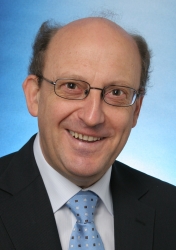IT-Systeme mit hohen Sicherheitsanforderungen verwenden in zunehmenden Maße Sicherheitspolitiken zur Beschreibung, Analyse und Implementierung ihrer Sicherheitseigenschaften. Zur präzisen Spezifikation von Sicherheitspolitiken werden Sicherheitsmodelle eingesetzt, die dann eine formale Analyse der Sicherheitseigenschaften ermöglichen, und aus denen dann Politikimplementierungen generiert werden können. Konventionelle Betriebssysteme setzen dieser Technologie enge Grenzen. Vielmehr sind hierzu neue Betriebssystemabstraktionen und Sicherheitsarchitekturen erforderlich, die die Integration von Sicherheitspolitiken in ein Betriebssystem ermöglichen. Der Vortrag stellt neue Kernabstraktionen und die Sicherheitsarchitektur des Vertreters einer neuen Betriebssystemgeneration vor.
Winfried Kühnhauser studierte Informatik mit Nebenfach Mathematik an der Universität Dortmund. Dort verbrachte er gleichfalls seine Assistentenzeit und wechselte anschließend zum GMD-Forschungszentrum Informationstechni
k in St. Augustin. An der GMD leitete er eine Vielzahl nationaler und internationaler Forschungsprojekte, zu denen sowohl Grundlagenforschungsprojekte auf dem Gebiet der verteilten Betriebssysteme und IT-Sicherheit als auch hieraus erwachsende Technologietransferprojekte gehörten. Er promovierte an der Technischen Universität Darmstadt und habilitierte sich auf dem Gebiet der Informatik.
Neben diesen Aktivitäten nahm er Gast- und Vertretungsprofessuren im In- und Ausland, Lehraufträge an verschiedenen Universitäten sowie Forschungsaufenthalte im Ausland wahr. Er ist Mitglied der Autorengruppe des Fernstudiengangs „Informationssicherheit“ und Autor zahlreicher internationaler wissenschaftlicher Publikationen. Im Jahre 2000 wurde Winfried Kühnhauser auf eine Professur an der Fakultät für Informatik und Automatisierung im Fachgebiet „Verteilte Systeme und Betriebssysteme“ an der Universität Ilmenau berufen und leitet dort seit 2001 das Institut für Praktische Informatik und Medieninformatik.


 Dieses TEWI-Kolloquium findet im Rahmen der
Dieses TEWI-Kolloquium findet im Rahmen der  Der Kurs „Computer Games“ der AAU wird im Rahmen der Studien für Informatik und Publizistik und Kommunikationswissenschaft angeboten. Angelehnt an internationale Hochschulen vermitteln wir in diesem Kurs die Entwicklung von Computerspielen. Im Vortrag im Rahmen des Academic Monday geht es um die Geschichte der Videospiele. Besprochen werden die ersten Computerspiele und eine zeitliche Einordnung der Entwicklungen.
Der Kurs „Computer Games“ der AAU wird im Rahmen der Studien für Informatik und Publizistik und Kommunikationswissenschaft angeboten. Angelehnt an internationale Hochschulen vermitteln wir in diesem Kurs die Entwicklung von Computerspielen. Im Vortrag im Rahmen des Academic Monday geht es um die Geschichte der Videospiele. Besprochen werden die ersten Computerspiele und eine zeitliche Einordnung der Entwicklungen.
 as Praktikum läuft bis jetzt sehr gut und die Kollegen sind wirklich sehr nett und hilfsbereit. Ich habe meine Arbeitszeit damit verbracht die Adobe Produkte für Videostreaming, Playback und Enhancement auf Desktopsystemen und Android Smartphones zu untersuchen. Dabei habe ich mich speziell mit Streamingmethoden wie dynamisches HTTP Streaming und Video Processing am Client auseinandergesetzt. Alle Details kann ich aber leider nicht verraten 😉
as Praktikum läuft bis jetzt sehr gut und die Kollegen sind wirklich sehr nett und hilfsbereit. Ich habe meine Arbeitszeit damit verbracht die Adobe Produkte für Videostreaming, Playback und Enhancement auf Desktopsystemen und Android Smartphones zu untersuchen. Dabei habe ich mich speziell mit Streamingmethoden wie dynamisches HTTP Streaming und Video Processing am Client auseinandergesetzt. Alle Details kann ich aber leider nicht verraten 😉

